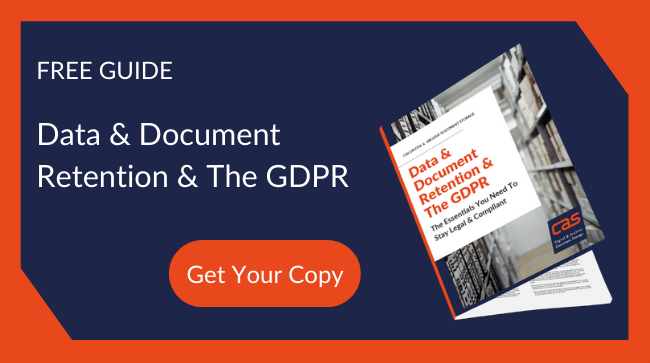All businesses and organisations accumulate data about their employees in the form of employment or HR records. These include information on pay and performance, hours worked, sickness absence, training, and disciplinary matters, and may be stored electronically or as hard copies.
After an employee has left a business, it’s vital to retain employment records for practical and legal purposes. For example, future employers may be asked to provide details of an individual’s employment for reference checks or safeguarding. Also, UK data protection law (including the GDPR) stipulates how records should be retained and disposed of to ensure personal information isn’t at risk of being compromised.
As employment records can date back several years, an efficient, well-organised storage system is a necessity to ensure information can be quickly retrieved and to comply with relevant legislation.
For How Long Do Employment Records Have To Kept?
The Data Protection Act 2018, which incorporates the General Data Protection Regulation (GDPR), does not specify how long employment records must be retained. Instead, the law simply states that documents, either in paper or electronic format, must not be kept for longer than is necessary for legitimate purposes. Paper records must be organised in a suitable filing system and, when records are no longer needed, they must be securely destroyed, e.g. by shredding.
As employers are advised to use their discretion when deciding for how long to keep HR records, the Chartered Institute of Personnel and Development (CIPD) sets out the recommended retention for different types of HR documents:
- Application and recruitment records, including notes: 6-12 months
- Personnel and training files: 6 years
- Sickness absence records: 3 months – 6 years
- Parental leave: 5 years from birth/adoption, or 18 years from birth if the children receives disability allowance
- Redundancy records: 6 years
- Pension benefits: 12 years from the end of any benefit payable
- P45 and P60: 6 years
- Payroll: 12 years
- Salary registers: 5 years
- Expense accounts: 6 years
- Patent/secrecy/non-disclosure agreements: 20 years
How Can My Business Store Confidential HR Records Securely?
The efficient storage of employment records can be a logistical nightmare for businesses, particularly if they have many employees. Not only do paper records take up space, but they also need to be organised, accessible, and secure. Electronic records must be protected from unauthorised access and backed up to ensure they aren’t destroyed if a data loss occurs.
At CAS, we offer several services that make safe and secure storage of employment records simple:
Secure cataloguing: Our experts will catalogue personnel records efficiently for secure off-site storage in our dedicated facility, ensuring your documents are safe yet accessible whenever you need.
CAS Cloud: Convert your paper records into digital versions for secure archiving in the Cloud in our ultra-secure portal, which offers rapid electronic searches, unlimited storage, and authorised access protocols. CAS Cloud is registered with the ICO and complies fully with GDPR.
Shredding: When HR records are no longer required, we can undertake secure document shredding and recycling to comply with the Data Protection Act, ensuring that confidential information is destroyed.
Find Out More
To find out more about our document storage solutions for employment records or to request a no-obligation quotation, get in touch with CAS today on 0845 5050 003.
Image source: Unsplash


